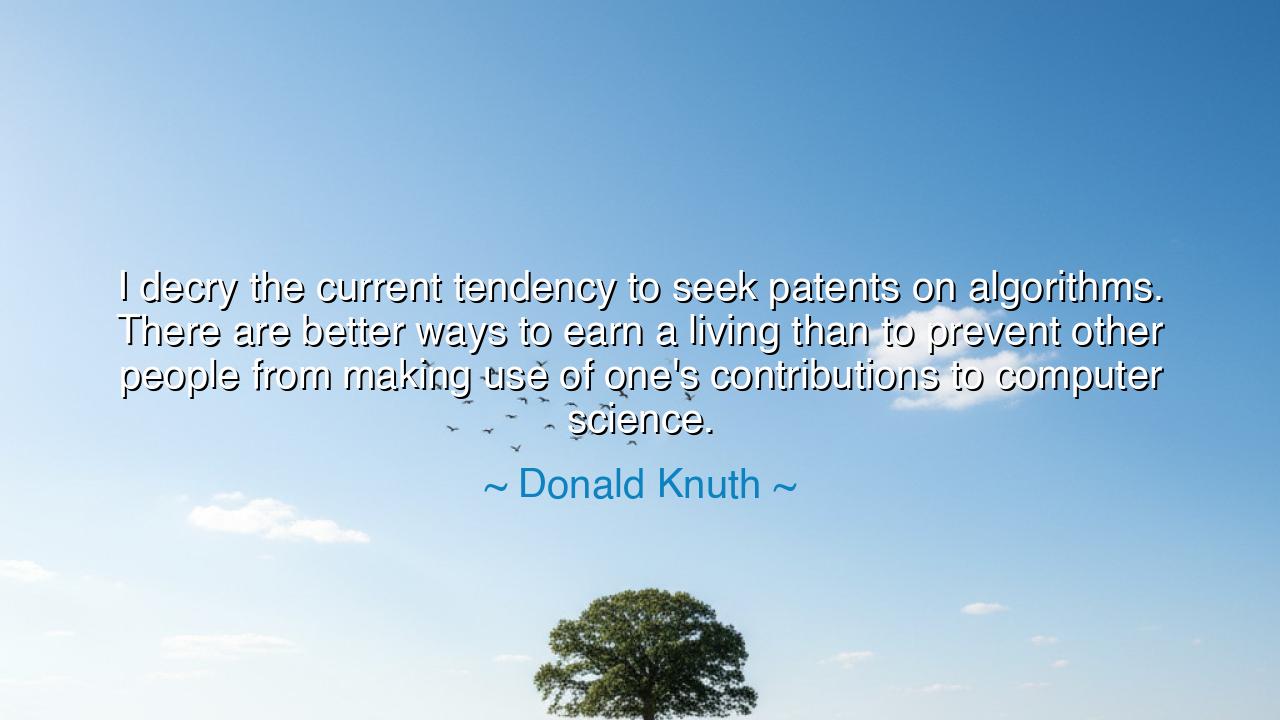
I decry the current tendency to seek patents on algorithms. There
I decry the current tendency to seek patents on algorithms. There are better ways to earn a living than to prevent other people from making use of one's contributions to computer science.






Listen closely, O children of the future, and hear the words of Donald Knuth, a master of computer science whose insights transcend the world of algorithms and coding. He spoke thus: "I decry the current tendency to seek patents on algorithms. There are better ways to earn a living than to prevent other people from making use of one's contributions to computer science." In these words, Knuth is not merely criticizing a practice, but calling forth a vision of generosity in the realm of knowledge—a challenge to the world to share rather than hoard, to build rather than restrict. For he understands that the true spirit of science and progress is not found in the clinging to ideas, but in the freedom to allow them to spread and grow.
In the ancient world, knowledge was often viewed as a sacred gift to be passed down from one generation to the next. The great philosophers—from Socrates to Aristotle, from Pythagoras to Plato—did not guard their teachings with iron fists, but shared their wisdom freely. Socrates was not concerned with ownership of his ideas, for he understood that true knowledge was not confined to a single mind, but lived in the hearts and minds of all who embraced it. Likewise, Knuth’s words echo this same spirit: knowledge and ideas are meant to be shared, not locked away for personal gain.
Patents, in their modern form, are often seen as a way to protect one’s ideas and to ensure that they are not used without compensation. Yet, Knuth, in his wisdom, sees a deeper truth: the true value of knowledge lies not in the ownership of it, but in its ability to enrich and empower others. By patenting an algorithm, for example, one is not simply protecting an idea; they are also restricting the ability of others to build upon it, to take it and make it greater. True progress in science, as in life, is not a solitary endeavor, but a collective one—it is only when knowledge is freely shared and built upon that we make true strides forward.
**Consider the great work of the ancient mathematicians, whose discoveries were not kept in secret but were passed from one scholar to the next. Euclid’s "Elements," a foundational text in geometry, was not his private property—it was a gift to humanity, freely shared and built upon by countless minds. Even in the modern world, figures like Alan Turing, the father of modern computer science, did not hoard their breakthroughs, but instead laid the foundation for future generations. Their work has been freely shared, and in doing so, they enabled countless other discoveries, and countless other minds, to flourish. The legacy of these pioneers lives on not in what they claimed as their own, but in the progress that followed from their willingness to share.
Knuth’s criticism of the patenting of algorithms is not just a concern for fairness, but a reminder that true greatness lies in giving, not in taking. The act of hoarding knowledge—whether through patents or any other means—creates barriers, restricting others from exploring, expanding, and improving upon what has already been created. In the realm of computer science, where ideas are often built upon the work of others, restricting access to algorithms creates artificial barriers to progress, stifling innovation. Knuth’s challenge, therefore, is not simply to think about how we can protect our creations, but how we can maximize their potential by sharing them with the world, letting them live and grow in the hands of many.
The lesson, O children of the future, is clear: In all things, seek not to claim ownership, but to contribute. The pursuit of knowledge is not a solitary endeavor, but a shared journey. Do not seek to own ideas, but to nurture them and allow them to flourish in the hands of others. True greatness is found in generosity—in the willingness to share what we know and allow others to build upon it. As Knuth’s words remind us, there are far greater rewards to be had when we freely share our knowledge and contribute to the collective good.
So rise, O seekers of wisdom, and take this lesson to heart: share your knowledge with the world. Do not hide it, do not lock it away, but let it spread, let it grow, and let it inspire. The true power of ideas is not in ownership, but in their ability to transform the world when they are shared. Just as the great minds of the past gave their ideas freely to the world, so too should you. In this way, we will build a future where knowledge flows freely, where progress is driven by collective effort, and where the brilliance of one mind becomes the foundation for the brilliance of many.






AAdministratorAdministrator
Welcome, honored guests. Please leave a comment, we will respond soon